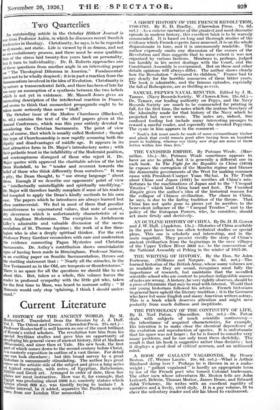Two 'Quarterlies An outstanding article in the October Hibbert - Journal-i s
one from Professor Alden, in which he discusses recent Swedish tendencies in theology. Christianity, he says, is to be regarded as dynamic, not static. Life is viewed by it as drama, and not as en evolutionary process, and there must be some qualifica- tion of the stress laid twenty-five years back' on personality, lest it turn to individuality. Dr. R. Roberts .approaehes one of these questions from another angle in an interesting paper on " The Theological Dilemma in America." Fundamental- ism is not to be wholly despised ; it is in part a reaction from the linnianentism involved in the idea of Evolution. Christianity is by nature a transcendental faith, and there has been of late far too easy an assumption of a synthesis between the two beliefs which is not yet in existence. Mr. Mansell Jones gives an interesting description of the intellectual reaction in France, and seems to think that monarchist propaganda ought to be taken more seriously than mere " bluff."
The October issue of the Modern Churchman (Blackwell, 8s. M.) contains the text of the chief papers given at the Annual Conference, which was this year entirely deyoted to considering the Christian Sacraments. The point of view was, of course, that which is usually called Modernist ; though this type of Churchmanship is now rapidly assuming both the dignity and disadvantages of middle age. It appears in its least attractive form in Dr. Major's introductory notes ; with their pathetic trust in the infallibility of the Modernist position, and contemptuous disregard of those who reject it. • Dr. Major quotes with approval the charitable advice of the late Dean Rashdall, to be " tender and reverent towards the belief of those who think differently from ourselves." It was a pity, the Dean thought, to " use strong language " about them. Enough if we describe our opponents' point of view as intellectually unintelligible and spiritually unedifying." Dr. Major will therefore hardly complain if some of his readers feel tempted to apply the Dean's kindly methods to his own ease. The papers which he introduces are always learned but often controversial. We feel in most of them that peculiar insensitiveness to supernatural values, that note of earnest, dry cleverness which is unfortunately characteristic of so much Anglican Modernism. The exception is Archdeacon Lilley's admirable and. valuable discussion of the sacra- mentalism of St. Thomas Aquinas ; the work of a fine theo- logian who is also a deeply spiritual thinker. For the rest Professor Percy Gardner reconsiders with care and moderation the evidence connecting Pagan Mysteries and Christian Sacraments. Dr. Astley's contribution shows unmistakable signs of having been made in Birmingham. Professor Nairne, in an exciting paper on Semitic Sacramentalism, throws out the startling statement that : " Nearly all the miracles, in the New Testament as in the Old, are tempests or thunderstorms." There is no space for all the questions we should like to ask about this. But, taken as a whole, this volume leaves the reader in profound sympathy with the little girl who, taken for the first time to Mass, was heard to murmur softly " If Mummie would only stop `splaining, I think I should under- land."






























































 Previous page
Previous page